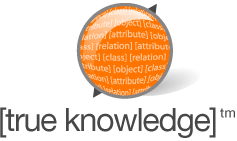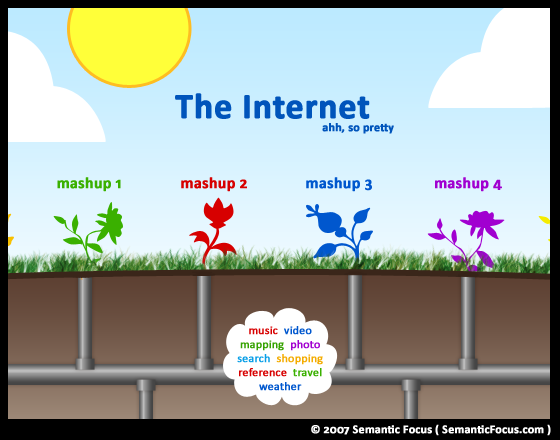19 results for service lifecycle
A lot of you emailed me asking where to find more videos, so I'm delivering the goods. I've expanded the previous list from a paltry 17 to a remarkable 302, and I've included podcasts this time! There were so many videos I had to break them up into different categories for easier skimming. There are no duplicates, however I did place some videos into more than one category when I felt it was appropriate. This list is monstrous, enjoy.
Continue reading 302 Semantic Web Videos and Podcasts!
 Swoogle describes itself as being the search engine for the Semantic Web. Swoogle crawls the web looking for RDF documents. At this time Swoogle offers the these services:
Swoogle describes itself as being the search engine for the Semantic Web. Swoogle crawls the web looking for RDF documents. At this time Swoogle offers the these services:
- Search ontologies and instance data
- Search terms (URIs that have been defined as classes and properties)
- Provide metadata of Semantic Web documents
- Support browsing the Semantic Web
- Archive different versions of Semantic Web documents
Continue reading Swoogle - the Semantic Web search engine
Natural Language Processing is very important to the Semantic Web. Language processing algorithm development will rise as better and smarter NLP agents are used to scour silos of raw textual data for semantic meaning. The addition of NLP Web services to the Web will give light to new and innovative mashups. An example mashup powered could be a service that uses a language processing agent to read a news article about the Apple iPhone and:
Continue reading Future value paradigms of the Semantic Web
The other day I was thinking, wouldn't it be interesting to see a site come out that essentially acts as a broker or mirror of metadata from other sites? You could go to this site, enter a URL and have the metadata from that page presented to you in clean, crisp XML. It would be even better if this was turned into a Web service and the API was free for anyone to use. I would imagine there would be quite a bit of mashing potential!
Continue reading Does the World Need a Metadata Extraction Service?
 Semantically-Interlinked Online Communities (SIOC for short) is a framework aimed at connecting online communities and discussions from blogs, forums, content management systems mailing lists, and anything else. In the current Web, communities such as forums and blogs are like islands - they contain valuable information but are not well connected or queryable. SIOC allows you to connect these sites, and enables the extraction of semantic information from unlimited discussion platforms.
Semantically-Interlinked Online Communities (SIOC for short) is a framework aimed at connecting online communities and discussions from blogs, forums, content management systems mailing lists, and anything else. In the current Web, communities such as forums and blogs are like islands - they contain valuable information but are not well connected or queryable. SIOC allows you to connect these sites, and enables the extraction of semantic information from unlimited discussion platforms.
Continue reading Connect Discussions Between Blogs, Forums, and more with SIOC
Microsoft has taken steps in the direction of supporting Semantic Web standards such as RDF, OWL, and SPARQL. While their support is minimal and not hyped very broadly it is still nice to see the them implementing these standards in their software. I also haven't seen any evidence that they wish to formulate a proprietary brand of these standards, so I have no complaints.
Continue reading How Microsoft Invests in Semantic Web Technologies
 True Knowledge is a natural language search engine and question answering site, but to leave it at that would not do the site justice. What makes it stand out from similar sounding services like Powerset and Freebase? True Knowledge tackles natural language search and question answering (much like Powerset and Hakia), and it also maintains a knowledge base of facts about the world (similar to DBpedia and Freebase). However, what makes True Knowledge stand out is that they've combined these features and encourage their userbase to contribute facts and add new knowledge.
True Knowledge is a natural language search engine and question answering site, but to leave it at that would not do the site justice. What makes it stand out from similar sounding services like Powerset and Freebase? True Knowledge tackles natural language search and question answering (much like Powerset and Hakia), and it also maintains a knowledge base of facts about the world (similar to DBpedia and Freebase). However, what makes True Knowledge stand out is that they've combined these features and encourage their userbase to contribute facts and add new knowledge.
Continue reading True Knowledge: The Natural Language Question Answering Wikipedia for Facts
A mashup is a hybrid Web application that combines complementary elements from two or more sources to create one integrated experience. Content used in mashups is generally sourced from a third party via an API or from Web feeds (e.g. RSS or Atom). Basically, the point is to take multiple data sources or Web services and turn them into something useful. The idea of combining Web services is not a new one, but it has gained immense traction in recent times and will likely continue to grow in popularity. In this entry I will be discussing both the promising future mashups offer and also potential pitfalls.

Continue reading Mashups: Opportunity, Innovation, and Money
Jim Rapoza at eWeek has an opinion about gaming the Semantic Web regarding companies and developers that are using the Semantic Web label inappropriately. He makes a good point worth mentioning: When an innovative new idea comes along and gets popular enough it is commonplace to see vendors and companies take some of the concepts and strategies of the idea and try to adapt them, but are often not true to the idea's core principals (either purposely or accidentally).
Continue reading Misrepresenting the Semantic Web
Gleaning Resource Descriptions from Dialects of Languages, or GRDDL enables us to automatically extract information from structured Web pages, creating a bridge between XHTML/Microformats and RDF, and the current Web and the Semantic Web.
Continue reading W3C Releases GRDDL as a Recommendation!
Recent searches
semantic, semantic web search, microsoft semantic web, semantic web blog, semantic focus, semantic web search engine, semantic web problems, semantic cms, semantic web search engines, semantic web, semantic web blogs, camp semantic, semantic web layer cake, natural language processing blog, semantic web microsoft, sparql php, semantic blog, natural language search, true knowledge, eswc 2009, object oriented web, protege tutorial video, rdf tags, introduction to semantic web, php sparql, microsoft rdf, microformats rdf, semantic web conference 2008, owl semantic web, problems with semantic web, rdf vs microformats, cody burleson, protege tutorial, rdf search engine, microformats vs rdf, rdf microformats, semantic web tutorial, semantic web conference 2009, rdf blog, eswc 2008, graphd, rdf microformat, semantic web rdf, blog semantic web, semantic web conference, european semantic web conference 2009, dbpedia freebase, web service life cycle, semanticfocus, python sparql, problems in semantic web, swoogle, curse of knowledge, semantic web introduction, semantic web issues, statistical search, semantic web layers, semantic web vision, twine blog, semantic web podcasts, owl videos, rdf tagging, semantic web natural language processing, arc rdf, falcons search engine, protege 4 tutorial, web videos, european semantic web conference 2008, semantic search engine, semantic web community, semantic web tutorials, semantic natural language processing, semantic web problem, semantic web videos, microformat rdf, natural language processing semantic web, web search engines, open calais, problems with the semantic web, rdf tag, semantic web cake, web thread, tower of babel, bin laden, rdf microsoft, semantic web technology stack, natural language processing blogs, natural language question answering, rdf owl, protege screencast, semantic web logo, problems of semantic web, information extraction blog, microformat vs rdf, protege video tutorial, domain knowledge, james simmons, seesaw effect, semantic search, semantic web references, the curse of knowledge, web 3.0 ideas, web semantic, blog semantic, cms tags, question answering, semantic web games, semantic web technology, aditya thatte, rdf video, spanish semantics, web evolution, data storage in oracle, different from, freebase rdf, microsoft and semantic web, problems semantic web, rdf vs microformat, web search engine, what is true knowledge, freebase dbpedia, jamie lewis blog, question answering wikipedia, semantics, web service ontology, zitgist, freebase linked data, introduction to semantic web vision and technologies, ontology blog, owl introduction, protege semantic, selfishness, semantic update, semantic web protege, focus semantics, freebase vs dbpedia, microformats and rdf, microformats vs, microformats vs semantic web, owl tags, protege semantic web, search engine semantic web, semantic web owl, altova tutorial, backlinks blog, calais initiative, eswc 2008 semantic, protege, semantic web microformats, semantic web research topics, semantic web technologies, arc semantic, natural language semantic web, oracle semantic web, owl semantic, problem with semantic web, rdf, semantic web layer, semantic web tags, service ontology, sparql python, vertical search engines, web blogs, blog rdf, cms semantic, dbpedia vs freebase, hyperdata, natural language processing semantics, ping the semantic web, python semantic web, rdf and microformats, semantic search engines, semantic search example, semantic web services, web object oriented, wikipedia question, wordpress semantic web, information extraction, international semantic web conference 2009, list of vertical search engines, microformats, microformats versus rdf, natural language processing, natural language processing wikipedia, object oriented web page, semantic conference 2008, semantic conference 2009, semantic web conferences 2008, semantic web conferences 2009, semantic web feed, semantic web video, social semantic web, w3c logo, web introductions, webblogs, evolution of semantic web, iri semantic web, issues in semantic web, language question, natural language question answering system, on whose vision is the semantic web concept based, oracle data storage, protege 4.0 tutorial, protege ontology, rdf versus microformats, search engines, search semantic web, semantic data storage, semantic web reference, service, web 3.0 opportunities, web services life cycle, aperture semantic, backlink blog, blog semantics, falcons semantic, hl, introduction of semantic web, leave a comment, legs blog, list of blogs, microsoft semantic web, natural language processing semantic, problem of semantic web, problem semantic web, protege tutorials, rdf blogs, rdf review, semantic web 101, semantic web conferences, semantic web natural language, semantic web podcast, semantic web searches, semantics is, service life cycle, service ontologies, vertical search engines list, web conference 2008, wikipedia natural language processing, arc semantic web, blog natural language processing, european semantic web 2008, foaf search, international semantic web conference, international semantic web conference 2008, introduction to semantic, iswc 2008, life cycle of web services, metadata extraction and tagging service, microformats tags, microsoft sparql, object oriented web pages, owl vs rdf, semantic news aggregator, semantic web 2009, semantic web algorithm, semantic web evolution, semantic web game, semantic web layer cake 2008, semantic web service, semantic web sites, service modeling, spanish semantic, sparql in php, tassilo pellegrini, the nature of selfishness, the semantic web is not a separate web but an extension, tutorial protege, camps semantics, eswc 2008 conference, eswc 2008 semantic web, falcons semantic web search engine, freebase, lowell vizenor, metadata extraction, natural language question, nature of selfishness, object oriented web site, oracle semantic store, owl rdf, pagead2.googlesyndication.com, problems of the semantic web, protege 4, rdf vs. microformats, search engines semantic web, semantic logo, semantic markup tags, semantic web searching, semantic web tools, spanish language semantics, starting a revolution, swoogle.com, tag rdf, the semantic web vision, web service lifecycle, wikipedia question answering, arc php, arc rdf php, blogs semantic web, dbpedia, focus, folktologies, microformats vs. rdf, mining tags, ontology, open calais python, podcast semantic web, problem in semantic web, protege introduction, rdf semantic web, search engine for semantic web, selfishness of mankind, semantic problems, semantic updates, semantic web algorithms, semantic web and search engines, semantic web feeds, semantic web part 4, semantic web vs web 2.0, service lifecycle, stochastic search, storage in oracle, using protege, weaving thread, web 3.0 blog, web technology topics, webservice lifecycle, zeitguiest, blog information extraction, blogs on semantic web, camp semantic, conference semantic web 2008, cross pollination wikipedia, eswc conference 2008, eswc tenerife, ftp p2p, information extraction open source, introduction semantic web





Recently Commented Blog Entries